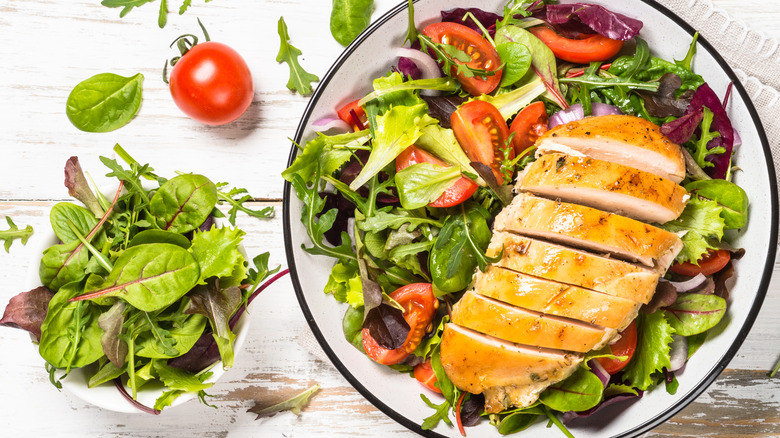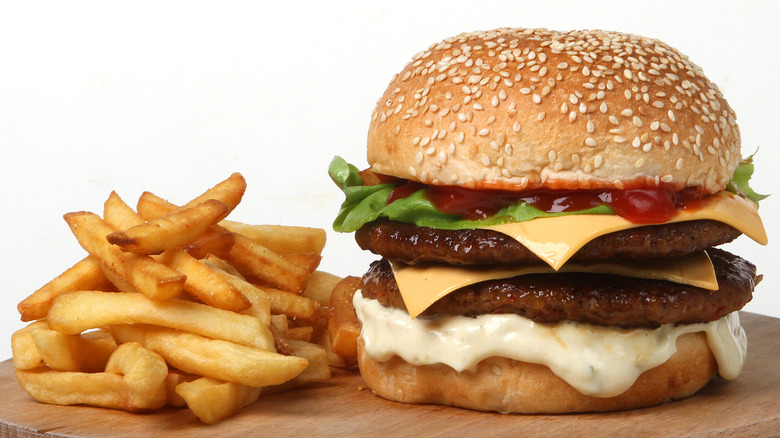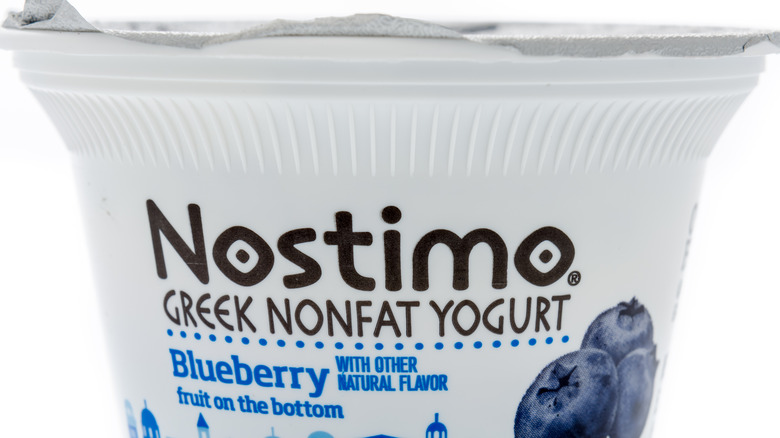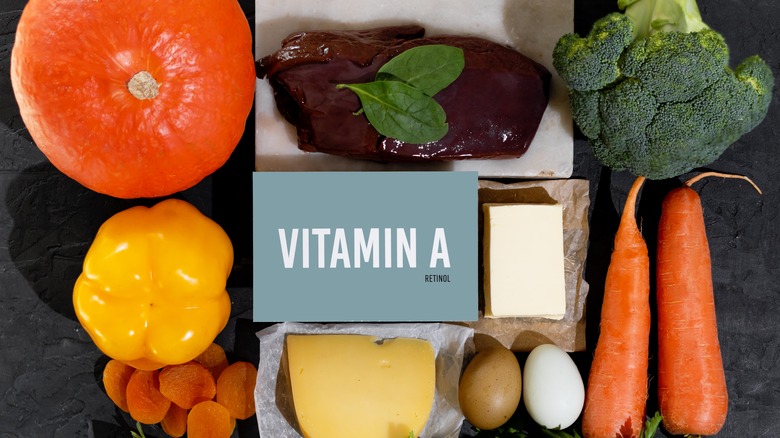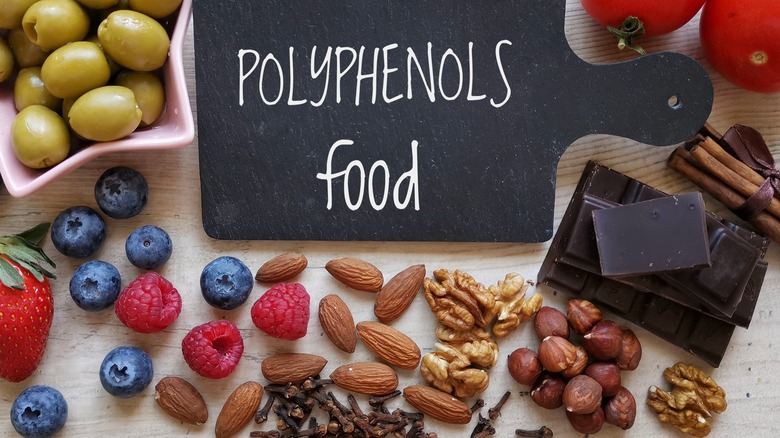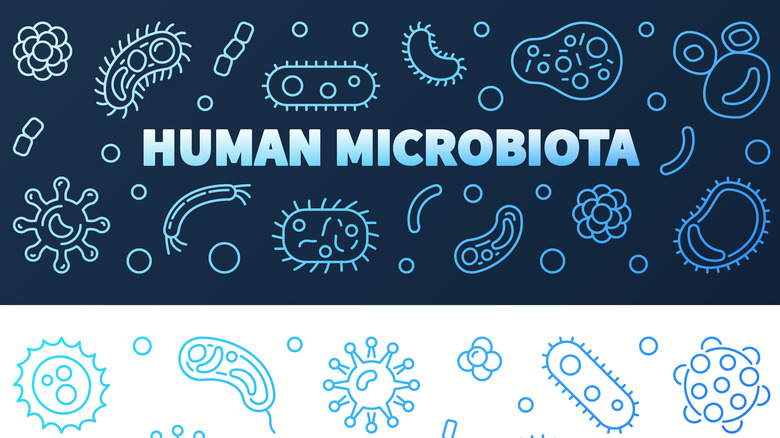Why Dr. Now's Weight Loss Advice Could Be Dangerous For You
The Dr. Now Diet (or Now Diet) was introduced by Dr. Younan Nowzaradan (aka Dr. Now), a Houston-based weight loss surgeon who specializes in treating the most challenging morbidly obese patients weighing over 600 pounds. Dr. Now is featured on the TV reality show "My 600-Lb Life," which follows the lives of obese patients as they attempt to lose weight through diet and bariatric (weight loss) surgery (via Healthline). He also helped Mayra Rosales ("Half Ton Killer") lose over 800 pounds (via ABC13).
Dr. Now designed the diet primarily as a strategy for obese patients to lose weight quickly in preparation for weight loss surgery. Super obesity, defined as a BMI of 50 or greater (the average American adult is around 26.5, per the CDC), increases the risk of complications related to surgery and anesthesia, via a 2014 study in the journal Clinics (Sao Paulo). Hospitalization of a group of 20 super obese adults for a supervised very-low-calorie diet prior to bariatric surgery was found to be a safe and effective approach to promote significant weight loss through 14 weeks. No major surgical and postoperative complications were observed in any of the patients.
The Now Diet is also indicated for severely obese people whose excess weight puts them at very high risk of developing serious health problems. The diet is very restrictive and should be undertaken only under medical supervision. So, what exactly is this diet?
The Dr. Now Diet
As described by U.S. News and World Report, the framework of the Now Diet consists of three basic principles represented by the acronym FAT: frequency, amount, and type. The suggested frequency is two to three meals per day with no snacks. The recommended amount is a daily intake of no more than 1200 calories, divided evenly into two meals of 600 calories or three meals of 400 calories. The type of food in the Now Diet features foods rich in fiber and protein while limiting carbohydrates and fats.
Dr. Now offers a few tips to make the diet easier to follow and eat the food you like, per Healthline. For example, a simple way to plan your Now Diet is to first write down all the foods you love to eat. Then, from that list, nix the foods high in sugar, fat and calories. The foods left on the list can form the core of your Now Diet. In order to stay under 1200 calories per day, Dr. Now also suggests favoring unprocessed whole foods and smaller portion sizes.
It's important to note that the Now Diet is indicated for use as a rapid weight loss strategy for one or two months prior to bariatric surgery. The diet should not be continued long-term.
Food allowed on the Dr. Now Diet
The list of allowed foods on the Now Diet includes low-fat protein foods such as egg whites, white meat and skinless chicken, white meat and skinless turkey, and lean fish, according to U.S. News and World Report (USNWR). Lean cuts of beef, tofu, and legumes (e.g., beans) are other allowed sources of protein, adds Healthline. Fats are limited to cooking spray and small amounts of oil for cooking.
All vegetables (except potatoes) and most whole fruits (except watermelon, cantaloupe, bananas, and mangos) are permitted. In keeping with the low-carb theme, certain whole grains are allowed but in moderation. These include wheat bread, wheat or corn tortillas, and whole wheat spaghetti. Among the nut & seed group, only chia seeds and flax seeds are acceptable. Dairy foods should be free of fat (e.g., skim milk or plain nonfat yogurt). Only nonnutritive (zero-calorie) sweeteners are approved by Dr. Now. Mustard and other low-carb condiments are suitable to add flavor to foods (via USNWR).
Per Healthline, the Now Diet is not limited to the above list of foods. Other foods are allowed provided meals are consistent with the high-protein, low-fat, low-carb, high-fiber, and sugar-free diet pattern.
Foods to avoid on the Dr. Now Diet
In general, high-calorie, high-fat, and high-sugar foods are not permitted on the Now Diet, reports Healthline. Even healthful and popular foods such as oatmeal, popcorn, peanuts, egg yolk, olive oil, and most nuts and seeds are prohibited. According to Dr. Now, the exclusion of these nutritious foods is due to either too many calories, fats (including added fats), or carbs.
Among the protein-rich foods to avoid are sugar-sweetened protein shakes, fatty cuts of meat, processed meats (e.g., hot dogs, bacon, sausage), whole eggs, and fried chicken and other fried and battered meats. In addition to olive oil, butter and vegetable oils are excluded as well. High-sugar fruits (e.g., bananas, mango), fruits with added sugar (e.g., syrupy canned fruit), and all fruit juices are disallowed. Also included on the banned food list are refined carbs such as chips, crackers, white rice, waffles, pancakes, white bread, and pasta, not to mention cookies, candy, cakes, pastries, honey, and syrup.
Per U.S. News and World Report, dairy foods that are full-fat or have added sugar (e.g., sweetened yogurt, sorbet, ice cream, milkshakes, chocolate milk, and full-fat cheeses) are not suitable for the Now Diet. Nuts such as almonds and cashews and unprocessed carbs such as potatoes are also forbidden because of their high fat and high carb content, respectively.
Benefits of the Dr. Now Diet
Research generally supports the use of low-calorie diets such as the Now Diet for quick weight loss. Per a 2018 study published in the journal Applied Physiology, Nutrition, and Metabolism, a low-calorie diet equal to around 1200 calories/day for 13 days resulted in significant weight (fat) loss in obese women, even without exercise. A key benefit from the weight loss was improved insulin sensitivity, which lowers the risk of type 2 diabetes.
Evidence also supports the benefit of quick weight loss before bariatric surgery to reduce the risk of complications and even death. According to a 2020 study in over 480,000 patients who underwent weight loss surgery (via JAMA Network Open), a high BMI (estimate of body fatness) before weight loss surgery was found to be associated with a higher risk of dying during operation or within 30 days after surgery. In the U.S., hundreds of patients die each year as a result of weight loss surgery. Impressively, weight loss prior to surgery, even a modest loss of less than 5% of body weight, was shown to significantly slash the risk of dying after surgery.
One potential mechanism for the beneficial effects of pre-surgery weight loss is a lower risk of blood clots, a leading cause of death from bariatric surgery. In addition, weight loss results in better nutrient status as well as blood sugar control, both of which contribute to improved surgery results and less mortality.
Long-term results of very-low-calorie diets
Very-low-calorie diets such as the Now Diet do not fare any better in the long term than diets with a more moderate calorie restriction, reports WebMD. This is because what matters most in achieving permanent weight loss is the ability to make lifestyle changes (e.g., regular exercise) after the diet is discontinued.
Furthermore, the Now Diet's 1200-calorie limit makes it very challenging for followers to meet nutrient requirements and feel satiated. With such a meager calorie allowance, they may even lack the energy needed for normal activities, particularly exercise. Fatigue, constipation, nausea, and diarrhea are temporary side effects of very-low-calorie diets, while formation of gallstones is the most frequently occurring serious adverse effect. Very-low-calorie diets are contraindicated for pregnant or breastfeeding women and, for the most part, children and teens. These diets may not be suitable for adults over age 50 as well.
Moreover, reducing calorie intake, in general, is not the solution to long-term weight loss (via a 2017 study in Perspectives on Psychological Science). Weight loss from dieting causes long-term changes in levels of gut hormones that regulate appetite (like leptin and ghrelin), resulting in increased appetite and calorie intake. Moreover, the body compensates for calorie restriction by lowering the metabolic rate. A slower metabolism coupled with increased calories ultimately leads to a return to the initial weight. In fact, up to two-thirds of people following low-calorie diets gained back more weight than they lost on their diets.
Effects of low-fat diets
While following a diet that is low in fat (e.g., the Now Diet) is generally perceived to be healthy, it is not consistent with a balanced diet and may cause health issues (via Healthline).
Some fats such as omega-3 fatty acids are essential because they cannot be made in the body. The omega-3 fats DHA and EPA play critical structural roles as components of the cell membrane surrounding all the cells of the body. Omega-3s also have important functional roles in the brain, central nervous system, and retina. Dietary fat is necessary for the production of sex hormones such as testosterone and estrogen, as well as other hormones that regulate inflammation and blood clotting. Yielding 9 calories per gram (versus 4 calories per gram for protein and carbs), fat is a major energy source and a key contributor to growth, development, and healthy immune function. Falling short on dietary fat can lead to skin inflammation, poor wound healing, frequent illnesses, hair loss, and vitamin deficiencies.
Per a 2016 study published in Clinical Nutrition, low dietary fat intake in a group of adults correlated with a higher incidence of metabolic syndrome, even though they consumed 500 calories less than a control group. Metabolic syndrome is a collection of cardiovascular risk factors including abdominal obesity, high blood pressure, insulin resistance, and abnormal levels of blood fats (e.g., LDL, HDL, triglycerides).
Risk of fat-soluble vitamin deficiency
A notable health concern about the Now Diet and other low-fat diets is the risk of becoming deficient in fat-soluble vitamins (A, D, E, and K). A sufficient amount of fat must be consumed at meals for these vitamins to be fully absorbed, according to a 2021 review of studies in The Open Access journal for Life & Environment research (Peer J).
It's clear that people on a low-fat diet may not optimally absorb critical fat-soluble vitamins. Vitamin deficiencies can lead to serious health problems. For example, a deficiency of vitamin A is a leading cause of blindness in children. Vitamins including A, D, and E may even contribute to the body's defense against Covid-19 owing to their antioxidant and immune-enhancing properties, as well as their role in supporting natural barriers against infection.
Adequate fat in a meal is also important for the absorption of supplements of fat-soluble vitamins. For a variety of reasons (including lack of sun exposure), many people today take vitamin D supplements. In a 2014 study in the Journal of the Academy of Nutrition and Dietetics, the absorption of vitamin D3 was considerably enhanced when it was taken with a fat-containing meal versus when taken with a fat-free meal.
Poor absorption of polyphenols
As described in a 2021 review of studies in the journal Foods, polyphenols are plant compounds such as quercetin and resveratrol that have profound health benefits. Polyphenols are widely distributed in foods and beverages, including fruits, vegetables, nuts, seeds, spices, extra virgin olive oil, wine, beer, and tea. In the plant, polyphenols function as a defense mechanism to protect the plant from damaging ultraviolet radiation (due to antioxidant effects) and from being devoured by microbes and herbivores (due to bitter taste). When consumed by humans, polyphenols have been documented to lower the risk of age-related diseases such as cancer, diabetes, and cardiovascular disease.
Despite their potent health-enhancing properties, polyphenols are poorly absorbed, i.e., only 5-10% of total intake is taken up by the small intestine (via a 2019 study in the journal Molecules). However, when consumed in the presence of fats such as olive oil, the absorption of polyphenols is improved. For example, a 2014 study in the Journal of Agricultural and Food Chemistry found that the addition of extra virgin olive oil to tomato sauce enhanced the extraction of polyphenols from the tomato, resulting in a greater number of polyphenols in the sauce. It logically follows that the absorption of these highly beneficial plant polyphenols may be compromised, at least to some degree, in people on low-fat diets such as the Now Diet.
Is the Dr. Now Diet sustainable?
The low-calorie, low-carb Now Diet is effective for short-term weight loss. However, in the long run, compliance with low-calorie and/or low-carb diets is often challenging, according to a 2018 review of studies published in the journal Healthcare (Basel).
Eating is meant to be enjoyable, and carbs and sugars are certainly tasty, particularly when paired with fat, notes another review of studies published in a 2021 edition of the journal Nutrients. Accordingly, diets such as the Now Diet that restrict carbs can make meals less palatable and lead to poor long-term compliance. Moreover, individuals on a low-carb eating plan often struggle with limited food choices, making them less likely to stick to the diet.
Dietary fat also makes food more appetizing and satiating (per the NIH). A 2017 study published in the European Journal of Nutrition compared the effects of three different diets for weight loss maintenance over 18 months. Participants in a control group (normal fat intake) reported significantly greater compliance with their diets compared to participants who consumed a moderate-fat diet or a low-fat diet. Poor compliance among the moderate and low-fat participants was associated with being deprived of favorite foods, as well as with challenges regarding eating out.
Changes in the gut microbiota
A healthy balance of the trillions of microorganisms (mostly bacteria) in the gastrointestinal tract, known as the gut microbiota, is associated with beneficial effects in type 2 diabetes and cardiovascular diseases, as well as immune and infectious diseases (per a 2020 review of studies published in Preventive Nutrition and Food Science). Conversely, an imbalance in the composition of the gut microbiota may contribute to the development of chronic metabolic and intestinal disorders by promoting inflammation and the overgrowth of harmful microbes. This imbalance of bacteria in the gut, also referred to as lower microbiota diversity, has been correlated with weight gain over a 10-year period, notes a review of studies in a 2018 edition of the British Medical Journal.
Restrictive diets (e.g., the Now Diet) have been shown to cause a reduction in the number of microorganisms in the gut microbiota, reports a 2017 systematic review of studies published in Obesity Reviews. These diets also lead to changes in the composition of the microbiota that can result in long-term harmful effects on the colon. For example, restrictive diets decrease levels of beneficial bacteria (like Firmicutes, Lactobacillus sp., and Bifidobacterium sp.) that produce a short-chain fatty acid called butyrate. Butyrate inhibits the proliferation of colorectal cancer cells (via a 2022 study in Biomedicines).
Risk of disordered eating
Chronic dieting, in general, is associated with the development of eating disorders, explains a 2020 review of studies published in the journal Cureus. People who are constantly dieting may suffer from the same psychological deprivation experienced by starving people.
For example, one study tested dieters' response to eating ad libitum food, i.e., eating freely until satisfied. Dieters who were first given a large, fattening pre-test "dose" of food subsequently ate more food ad libitum than when they were given no prior food. The reverse effect was observed in non-dieters. These findings suggest that chronic dieting causes abnormal hunger signaling that can lead to a binge eating disorder.
According to the National Eating Disorders Association, 35% of college students who diet to lose weight become obsessive, and about a quarter of those students develop eating disorders. Additionally, social media messages about thinness and dieting increase the risk of eating disorders in younger people, notes the University of Michigan School of Public Health.


